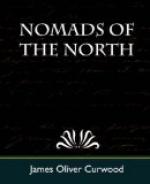A clever man was Henri Durant!
CHAPTER NINETEEN
During the last few days in December all trails for ten thousand square miles around led to Post Fort 0’ God. It was the eve of OOSKE PIPOON—of the New Year—the mid-winter carnival time of the people of the wilderness, when from teepees and cabins far and near come the trappers and their families to sell their furs and celebrate for a few days with others of their kind. To this New Year gathering men, women, and children look forward through long and weary months. The trapper’s wife has no neighbour. Her husband’s “line” is a little kingdom inviolate, with no other human life within many miles of it; so for the women the OOSKE PIPOON is a time of rejoicing; for the children it is the “big circus,” and for the men a reward for the labour and hardship of catching their fur. During these few days old acquaintanceships are renewed and new ones are made. It is here that the “news” of the trackless wilderness is spread, the news of deaths, of marriages, and of births; of tragic happenings that bring horror and grief and tears, and of others that bring laughter and joy. For the first and last time in all the seven months’ winter the people of the forests “come to town.” Indian, halfbreed, “blood,” and white man, join in the holiday without distinction of colour or creed.
This year there was to be a great caribou roast, a huge barbecue, at Fort O’ God, and by the time Henri Durant came within half a dozen miles of the Post the trails from north and south and east and west were beaten hard by the tracks of dogs and men. That year a hundred sledges came in from the forests, and with them were three hundred men and women and children and half a thousand dogs.




